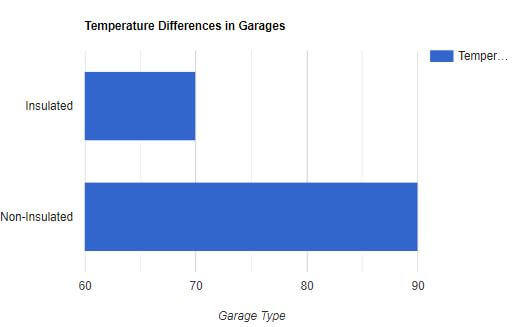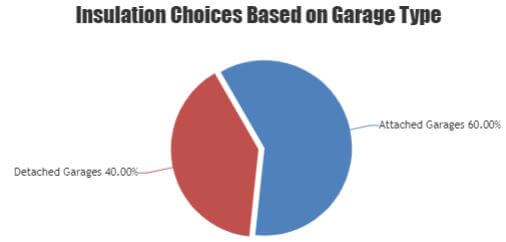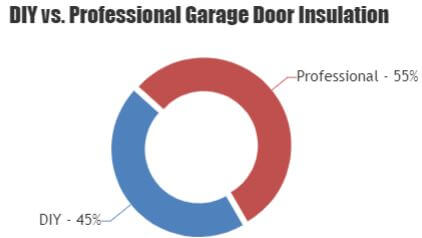Yes, an insulated garage door makes a significant difference. It enhances energy efficiency and provides temperature control within the garage.
An insulated garage door is a crucial element in maintaining an optimal temperature in your garage, especially during extreme weather conditions. The insulation helps in reducing the transfer of heat or cold into the garage, ensuring it remains warm in winter and cool in summer. This not only makes the garage a comfortable space but also contributes to energy savings by reducing the strain on heating and cooling systems.
Comparing the cost of insulated and uninsulated garage doors, the former might be a bit more expensive initially. However, the long-term benefits, including energy savings and enhanced durability, often outweigh the initial cost. Insulated doors are constructed with materials that stand up to various weather conditions, ensuring longevity.
The temperature difference offered by garage door insulation is notable. Insulated doors assist in maintaining a balanced temperature, which can be particularly beneficial for attached garages that share a wall with the home. This temperature regulation can contribute to a reduction in energy bills.
There are both pros and cons associated with insulated garage doors. On the positive side, they offer temperature control, energy efficiency, and noise reduction. On the flip side, they can be more expensive upfront compared to non-insulated doors.

For those with a detached garage, you might wonder if insulation is necessary. While it’s not mandatory, an insulated door can transform your garage into a usable workspace or storage area, protecting it from extreme temperatures.
The benefits of an insulated garage door extend beyond temperature control. They also add strength to the door, making it more durable and resistant to dents and damage. For those considering a DIY approach, garage door insulation kits are available, offering a cost-effective solution to enhance insulation.
If you’re pondering whether to insulate your garage door, consider the climate in your location, the purpose of your garage, and your energy savings goals. We invite you to read the detailed article below to gain more insights and make an informed decision.
Insulated Garage Doors – Do They Truly Make a Difference?
The Basics of Garage Door Insulation
What is Garage Door Insulation?
Garage door insulation refers to the process or method of adding insulating materials to your garage door. Think of it like wrapping your garage in a cozy blanket. This “blanket” helps in keeping the desired temperatures inside while blocking the external ones. It’s not just about warmth; it’s about creating a barrier against external temperatures, be it hot or cold.
Why Consider Insulating Your Garage Door?
Ever walked into your garage on a chilly morning and felt like you’ve entered an icebox? Or perhaps on a scorching summer day, it feels like an oven? Insulating your garage door can help moderate these temperature extremes, making your garage a more comfortable space year-round. Plus, it can save you some bucks on energy bills!
Cost Analysis
Initial Investment – Insulated vs. Non-Insulated Garage Doors
While insulated garage doors might have a slightly higher upfront cost compared to their non-insulated counterparts, they often pay off in the long run. Think of it as buying a thermos instead of a regular cup. Sure, the thermos might be pricier, but it keeps your drink hot or cold for hours!
Long-Term Savings and ROI
Over time, the energy savings from an insulated garage door can add up. By maintaining a more consistent temperature in your garage, you reduce the strain on your home’s heating and cooling systems, leading to lower energy bills.
Comparative Costs of Insulated and Uninsulated Garage Doors Over Time
| Year | Insulated Garage Door Cost ($) | Uninsulated Garage Door Cost ($) | Energy Savings with Insulation ($) |
| 1 | 1200 | 1000 | 50 |
| 2 | 1200 | 1000 | 100 |
| 3 | 1200 | 1000 | 150 |
| 4 | 1200 | 1000 | 200 |
| 5 | 1200 | 1000 | 250 |
Temperature Regulation and Energy Efficiency
How Insulation Affects Garage Temperature
Insulation acts as a barrier, reducing the amount of heat or cold transferred from the outside. This means during winters, the cold stays out, and during summers, the heat stays out. It’s like having a personal climate control system for your garage.
Energy Savings and Environmental Impact
By regulating the temperature inside your garage, you’re not just saving on energy bills but also reducing your carbon footprint. Less energy consumption means fewer greenhouse gas emissions, making your garage green in more ways than one!
Temperature Differences in Insulated vs. Non-Insulated Garages

Weighing the Pros and Cons
Benefits of Insulated Garage Doors
Insulated garage doors offer a plethora of advantages. From energy savings to noise reduction, the benefits are tangible. Imagine your garage door acting like a shield, protecting your garage from external noises, be it the neighbor’s loud music or the constant traffic hum.
Potential Drawbacks and Considerations
Like everything in life, there’s no one-size-fits-all. While the benefits are numerous, some might find the initial cost a bit steep. And if you live in a region with mild temperatures year-round, the insulation might not be as crucial.
Insulated Garage Doors for Different Types of Garages
Attached vs. Detached Garages – Does It Matter?
Whether your garage is attached to your home or stands alone like a sentinel in your yard can influence your decision. An attached garage shares a wall with your home. Insulating it can mean better temperature control for both the garage and your home. On the other hand, a detached garage might not impact your home’s temperature as much, but insulation can still make it a more comfortable workspace.
Percentage of Homeowners Choosing Insulation Based on Garage Type

DIY Insulation – Is It Feasible?
Overview of Garage Door Insulation Kits
For the hands-on folks out there, DIY garage door insulation kits are a thing! These kits come with everything you need to give your garage door that insulating boost. It’s like giving your garage door a cozy sweater to wear.
Steps to Insulate Your Garage Door Yourself
Roll up those sleeves and get ready! Start by measuring your garage door panels, then cut the insulation to fit. Secure it in place, and voila! You’ve got yourself an insulated garage door. Remember to always follow the manufacturer’s instructions for best results.
Popularity of DIY vs. Professional Installation

– How Can I Ensure the Security of My Garage Without a Garage Door Opener?
If you’ve lost your garage door opener, don’t panic. Follow the steps for replacing a lost garage door opener to ensure the security of your garage. First, disconnect the power to the garage door opener, then remove the old opener and install the new one. Finally, program the new opener to secure your garage.
Will an Insulated Garage Door Help with the Noise Issue?
If you’re experiencing a troubleshooting noisy garage door, investing in an insulated garage door can help reduce the noise. Insulated doors can provide better soundproofing, keeping the noise from the garage to a minimum. Consider upgrading to an insulated door for a quieter and more peaceful environment.
Strength, Durability, and Other Overlooked Benefits
How Insulation Adds to Garage Door Strength
Insulating your garage door isn’t just about temperature. It’s also about giving your door some added muscle. Insulated doors tend to be more robust and resilient, standing up to the daily wear and tear better than non-insulated ones. It’s like comparing a sturdy hiking boot to a regular shoe.
Noise Reduction and Other Lesser-Known Advantages
Beyond temperature and strength, insulation can be your garage’s noise-canceling headphones. An insulated door can significantly reduce the amount of external noise that seeps into your garage. So, if you’re using your garage as a workshop, music studio, or just a peaceful retreat, insulation can make a world of difference.
So, after all this, what’s the verdict? Insulated garage doors offer a range of benefits, from energy savings to noise reduction. While there’s an initial investment, the long-term gains, both in terms of comfort and cost savings, are hard to ignore. Whether you’re considering it for an attached or detached garage, or thinking of a DIY project, insulating your garage door is a decision worth pondering. And remember, it’s not just about the cold or heat; it’s about creating a comfortable, efficient, and functional space.
About This Writer

Hi, I am Eric Devin and I am a professional interior architect. Since childhood, I've always enjoyed DIY projects! And, I have loved to solve simple household problems using essential tools and equipment. I have also acquired a lot of information about basic household tools settings by working with contractors.